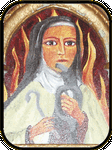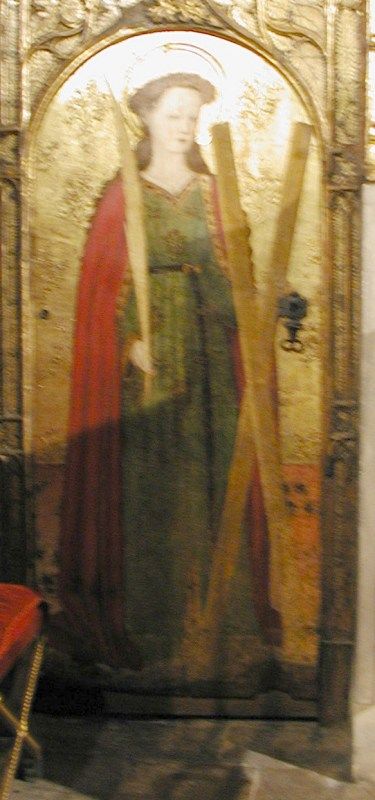Today, December 10, we celebrate the feast day of Saint Eulalia (290-304), child martyr and Virgin of the Church. Saint Eulalia, though only twelve years old, sought out those persecuting Christians, attempting to convert them to the true faith. For her faith and courage, Saint Eulalia received the martyr’s crown, her reward in heaven.
The life and acts of Saint Eulalia were recorded by Spanish-Roman poet, Prudentius. Of her, he wrote: "Noble of stock, and nobler still in the quality of her death, the holy maid Eulalia honors with her bones and tends with her love her own Emerita, the town that gave her birth. Far in the west lies the place that has won this signal honor; as a city, great and populous, but greater through the blood of martyrdom and a maiden's tombstone."
The works of Prudentius pass down the tradition and story that is the life of Saint Eulalia. Apart from his record, little is know about her brief years on this earth. We do know that she was born to a wealthy family in the suburbs of Barcelona, Spain. She is reported to have been a child prodigy, wise beyond her years, and zealous in her faith. She was raised Christian, consecrated herself to the Lord, and generally experienced a trouble-free and enjoyable childhood. Most evenings and mornings were spent in prayer, but the majority of her time was spent in childhood pursuits.
As legend tells us, when Eulalia was approximately twelve or thirteen years old, the Emperor Diocletian of Rome sent a judge to Barcelona to persecute Christians. As the Christian faith was spreading rapidly across the empire, which the emperor viewed as a threat to his authority, he dispatched a cruel and sinister man, Judge Dacian. While his reputation proceeded him, his actions surpassed anything the fledgling Christian community could have anticipated, and with his arrival years of some of the worst persecutions of the time began.
To start, Judge Dacian organized public offerings to the pagan gods and goddesses, expecting and obliging Christians to participate and offer sacrifices. Those who did not, were tortured, and unless they renounced their faith and offered sacrifice, generally executed.
News of this great persecution reached Eulalia, who prayed about it while determining a course of action. One morning, before dawn, she snuck from her parents home (careful not to wake them) and walked into the city—which was some distance. In Greek, Eulalia means “one who speaks well,” and she made it her intention to do so that day. Upon arrival in the city center, Eulalia proceeded to the forum where the court of Judge Dacian was convened. Finding him sitting amongst the people, she crossed the lines of soldiers and stood before him. In a loud voice, Eulalia spoke:
“You, how come that you are sitting here, full of pride, to judge Christians? Don’t you fear God, the one who is above the emperors, the one who wants the people to worship Him, and only Him? Now you have the power, but your power is useless in God’s eyes.”
At first the judge was amused at this small child speaking to him. Then he was impressed by her courage, and finally, he became irate. “Who are you, girl, without fear? All these affirmations you say are against the imperial law!”
Courageously, Eulalia is said to have answered: “I am Eulalia, servant of my Lord Jesus Christ. I trust Him and that is why I cam here without fear to contest your conduct, which is the one of an ignorant.”
Livid, Dacian ordered her arrested and tortured. Despite her age—in fact, perhaps because of her age—he ordered the worst series of tortures imaginable, allowing Eulalia to free herself from such treatment by sacrificing to the pagan gods. She was raked across the sides, exposing the bone, with metal hooks, but she referred to her wounds as the “trophies of Christ.” Her breasts were severed and she was put into a barrel filled with knives and glass and rolled over the uneven streets. Upon removing her, Eulalia said to her torturers: “The tortures you are inflicting me make me greater and the wounds don't hurt, because God is at my side. He will judge the abuses of authority you are responsible for.”
Judge Dacian was incensed at her faith. He ordered her burnt, but legend tells us that the flames extinguished upon touching her skin, but not before burning those attempting to harm her. Eventually, she succumbed to the torture, and at the moment of her death, her lips opened, and her soul—in the form of a white dove—flew from her lips into the heavens.
Judge Dacian ordered the soldiers to hang the young girl’s mangled body in a cross, as a warning to the public, and so that scavenger birds would come and disrespect her body. However, as they followed their orders, a heavy snow blanketed the city—despite the warm weather—covering her body and leaving her unspoiled. The soldiers, afraid, left their posts and the friends and family retrieved her holy body, burying it. Over the years, the relics of Saint Eulalia were moved, to escape destruction by invading forces. They now lie in the crypt of the cathedral bearing her name in Barcelona.
The life of Saint Eulalia, though brief, is filled with the courage and certainty of an adult faith. How often do we stand by and allow the Church, and our beliefs, to be attacked. This twelve year old girl confronted the highest and most frightening authority in the region, all to proclaim and defend her faith in Christ. Today, on her feast day, we pray for the courage of Saint Eulalia, and the conviction to live our faith visibly.
Day 344 of 365
Prayer Intentions: Courage to live our faith visibly.
Requested Intentions: Successful employment and financial assistance for education (M); For the return home of father and husband suffering from mental illness (C); Successful passing of examination; Employment for Son (J); Healing of a family and son (S); Successful marriage (G); End to husband’s addictions; Son’s employment (M); Freedom from financial burdens (M); Healing after a miscarriage (E); For healing of friend; successful resolution of legal matter (A); For unity between estranged friends (E); For a son, falsely arrested (C); Successful employment (J); Successful employment (L); For a healthy child (L); Recovery from stomach illness of a friend (A); Employment and financial security (E); Conversion of sons (L); Freedom from financial stress, employment (C); Spiritual growth and family peace (A); Freedom to immigrate (D); End to debt (N); Restoration of a marriage (J); Complete recovery of son (P); Recovery of parish priest, health of mother, conversion of son (J); Successful employment, end to depression (J); Successful immigration and employment (S); Conversion of an unloving daughter (M); Recovery of husband, health of mother, economic freedom (R); Freedom from depression, restoration of family relationships (N); Restoration of a relationship (J); Healing of friends from cancer (J); Complete healing of a friend with pancreatic cancer (J); Healing of a father following stroke (S).
Why pray the Rosary every day for a year?
Each time the Blessed Virgin has appeared-- whether it be to Saint Bernadette Soubirous at Lourdes; to Lucia, Jacinta, and Francisco at Fatima; or to Mariette Beco at Banneux-- she has asserted the importance, saving grace, and power of praying the Holy Rosary on a daily basis. Based upon her words, the Rosary is penance and conversion for sinners, a pathway to peace, an end to war, and a powerful act of faith in Jesus Christ. Pope Paul VI presented the Rosary as a powerful means to reach Christ "not merely with Mary but indeed, insofar as this is possible to us, in the same way as Mary, who is certainly the one who thought about Him more than anyone else has ever done."
To show us how this is done, perhaps no one has been more eloquent than the great Cardinal Newman, who wrote: "The great power of the Rosary consists in the fact that it translates the Creed into Prayer. Of course, the Creed is already in a certain sense a prayer and a great act of homage towards God, but the Rosary brings us to meditate again on the great truth of His life and death, and brings this truth close to our hearts. Even Christians, although they know God, usually fear rather than love Him. The strength of the Rosary lies in the particular manner in which it considers these mysteries, since all our thinking about Christ is intertwined with the thought of His Mother, in the relations between Mother and Son; the Holy Family is presented to us, the home in which God lived His infinite love."
As Mary said at Fatima, "Jesus wants to use you to make Me known and loved. He wishes to establish the devotion to My Immaculate Heart throughout the world. I promise salvation to whoever embraces it; these souls will be dear to God, like flowers put by Me to adorn his throne."

Subscribe to:
Post Comments (Atom)

















0 comments:
Post a Comment
Thanks for leaving a comment. If you wish to submit a prayer request, however, please do so above, using the "Contact" tab.